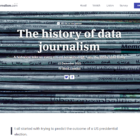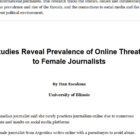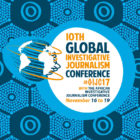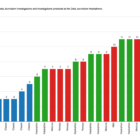This is a research paper that was presented at the Global Investigative Journalism Conference 2017 Academic Track, which IJEC organized and covered.
In this paper, M. C. Rasmin, Director of the Sri Lanka Development Journalist Forum; Dr. S. Raguram, University of Jaffna; and Mohamed Azad, Country Manager, IWPR, Sri Lanka provide an overview of investigative journalism in Sri Lanka. As a case study they look at a community-centered video investigative project.
“Investigative journalism in its true sense plays a key role in maintaining accountability and transparency on issues affecting people in general. The recent studies conducted by International Institute of War and Peace Reporting (IWPR, 2017), International Research Exchange Board (IREX, 2017,) International Media Support (IMS, 2017) and Free Media Movement (FMM) observed that investigative journalism in Sri Lanka is growing slowly while facing a systemic challenge, as a result of weak media pluralism, lack of editorial independence, political and commercial orientation of media ownership, insecurity, impunity and a lack of enabling policy environment etc.”






